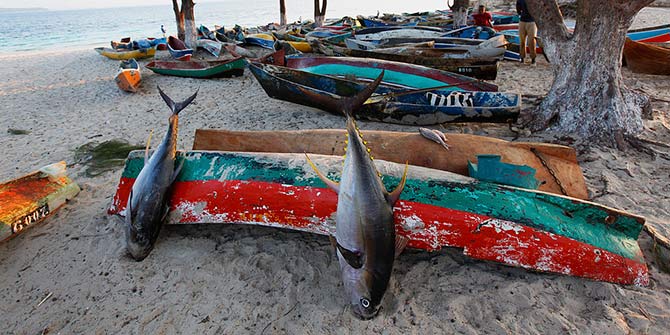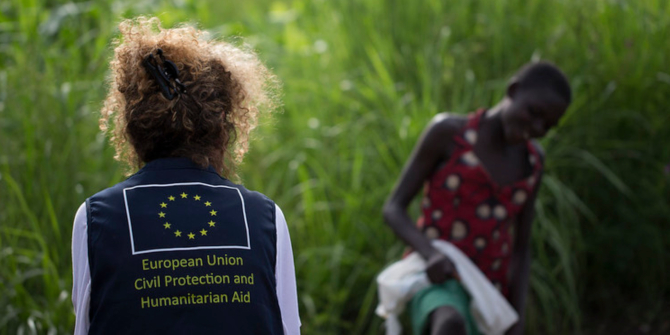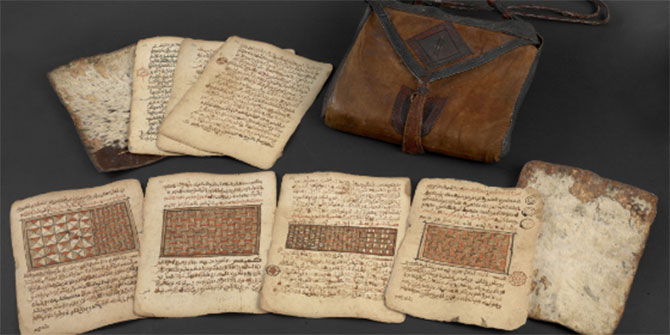Through the story of Chol, LSE’s Naomi Pendle explores the meaning of exile and the lived experience of being a refugee through cycles of displacement and return. In the first article of this two-part series, Pendle tells us how Chol rebuilt home after years spent in exile.
This article is part of our #LSEReturn series, exploring themes around Displacement and Return.
“It will be a shame to our family if your wife dies here”.
Chol recounted this decisive statement of his uncle as Chol made the decision to start his journey from rural South Sudan to Khartoum in 2014.[1] Chol is a research assistant on LSE’s AHRC and ESRC funded Politics of Return project. He is also a South Sudanese refugee who fled into exile in Sudan in 2014. He previously lived in Khartoum during the wars of the 1990s and 2000s. His research for the Politics of Return project focuses on public authority and social repair through Nuer customary laws and courts during cycles of displacement. As an introduction to Chol’s perspective and position, this blog tells the story of Chol’s formative journey into exile. It helps us understand what exile and being a refugee means in his lived experience of being a refugee and of socio-political status through cycles of displacement and return.
Much research has helped us understand the causes of displacement, the impact of displacement and the experiences of resettlement. At the same time, a small, nascent literature also calls us to pay attention to the refugee journey itself – the journey that people take into ‘exile’ – and the significant part this journey can play in the actual process of ‘becoming’ a refugee. This blog tells the story of the return journey into exile of Chol. Chol’s account of his journey from his ‘home’ village to Khartoum is not only a process of becoming a refugee, but is also a process of return and a process of constituting himself as a husband and father. He negotiates his socio-political standing during his time as a refugee through the protection of his wife during the journey into exile. His story highlights that the macro trajectories of large refugee movements themselves intersect with people’s own personal socio-political attempts to reconstitute power and relationships.
Chol’s journey in 2014 from the Western Nuer village of Rubkuany to Khartoum was not only a journey into exile in Sudan; it was the process by which he became a ‘refugee’ for the first time. Chol was returning to familiar places of safety where he had lived before. However, since his departure, South Sudan had become a separate nation state and his movement was now as a refugee. However, in the politics of daily life, during his journey he also became a husband and father, gaining networks among other Western Nuer. It is these networks that were safety and authority for Chol.
Chol’s History
Chol had lived in Khartoum before. The first time he lived there he was not a refugee as the South was then still part of a united Sudan. Chol was originally born in his ancestral homelands in the Western Nuer (Southern Sudan). In the 1970s, the first oilfields were discovered at Tharjath, just north of Chol’s homeland. From 1983, the Sudan People’s Liberation Army launched a rebellion against the Sudan army. Southerners both supported and fought against the SPLA. The discovery of oilfields in the Western Nuer made Chol’s homeland of strategic national importance and it became an epicenter of the wars of the 1980s and 1990s. This context eventually prompted Chol to move to Khartoum. It was in settlements on the edge of this national capital that Chol completed his primary and secondary education. It was there that he grew up. He eventually enrolled at the University of Bahr al-Ghazal. The University of Bahr al-Ghazal had been based in the large, Southern city of Wau. However, by Chol’s enrollment, because of the SPLA war, the university was based at a temporary campus in Khartoum.
In 2005, the SPLA signed a peace agreement with the Sudan government. This agreement promised a referendum on Southern succession in 2011. As the referendum date approached, the independence of South Sudan appeared increasingly likely. Many Southerners in the north chose to return to the South both to return ‘home’, but also to avoid the uncertainty surrounding their citizenship status in the north if Southern independence was granted.
With the new peace in the south, faculties of Southern universities also started to return to their original campuses in the Southern cities of Juba, Wau and Malakal. Suddenly these university campuses started to return to life, and decaying buildings were swamped with students, lecturers and tea ladies.
I met Chol when he was studying and I was teaching at the University of Bahr al-Ghazal. His course in development economics was transferred from Khartoum to Wau during his studies. English was the new language of tuition. For Chol, Wau was unfamiliar, alien and far from social networks that he could draw upon. Yet, over-crowded dorms and a diverse student body forced new networks of friendship. Chol had returned to South Sudan as a relatively, highly educated man. After graduation, Chol moved back to the Western Nuer to teach at a secondary school in Ler. It was named after Emma – the then Vice President’s late, English wife. It was his education that had defined his journey back to South Sudan and the opportunities he had to make home.
As with many men who came back to South Sudan, Chol rebuilt ‘home’ through marriage and the starting of his own family.[2] Coming ‘home’ to the unfamiliar lands of South Sudan were intricately bound with him becoming a man and having a home of his own.

The post 2005 era of peace was defined by a new burst of enthusiasm for Southern development and state building. In the Western Nuer, a new, large marrum road was the apex of this peacetime development. The government with the help of Chinese companies built a long, marrum road that stretched from the regional headquarters of Bentiu to the south. In an almost straight north-south line, it passed the Tharjath oilfields and then continued without deviation towards to the southern, Dinka town of Rumbek.
About halfway south along this road, another marrum road led off to the east. This led to Ler and the local port of Adok. At this junction in the road was the thriving market village of Rubkuany. Many of the small shops had iron-sheeted roofs. A generator lit the market at night through a hazardous web of wires that sat on the wet mud of the clay soil.
I met Chol again one evening in early 2013 in this busy, road-side village. It had been two years since his graduation. Chol led me to a small thatched, mud hut on the opposite side of the crossroad, at a distance from the market. The tukal looked oddly isolated, with no neighbours, fence or surrounding garden. Yet, Chol led me to this new home with pride. Inside, sitting on their bed, was Chol’s new wife and tiny, few-month-old child. He talked of finally having a ‘home’. They had married the year before.
Chol’s marriage was of particular pride to his family and its details cemented Chol’s belonging in the socio-political networks of the Western Nuer. Many of Chol’s former classmates from his childhood in the Western Nuer had gone on to be significant political and military leaders in various sides in South Sudan’s civil wars. Many of them had not lived in Khartoum but had fought as soldiers in the wars. They had the authority and then wealth that accompanied a history of military service. They now had titles, honours and access to government revenues that Chol did not have. However, the way Chol won his wife allowed him to reclaim his sense of status among his peers.
When Chol fell in love with his wife, a local MP was also competing for her affections and had offered her parents a large number of cattle for her bride wealth. As an MP in 2012 in South Sudan, he had access to government funds that were sourced from the oil revenues of government. However, Chol’s large family each contributed small numbers of cattle so that Chol could offer a competing bride price. Chol’s family also carefully petitioned the wife’s family with pledges of care for their daughter. The competition over this girl became the talk of the town for weeks. Eventually, the girl’s parents were persuaded by Chol’s family’s offer and she was given to Chol to marry.
For Chol’s whole family, Chol’s wife’s care was now intimately linked to their family’s reputation and integrity. Her safety and that of her children was an indicator of Chol’s own ability, trustworthiness and belonging in the Western Nuer.
In part 2 of this article, find out how Chol’s flight into exile was intricately linked to him proving himself a trustworthy husband and father.
Find out more about the Politics of Return and our Trajectories of Displacement research projects, which are based at the Firoz Lalji Centre for Africa and funded by ESRC/AHRC.
Dr Naomi Pendle is a Research Officer at the Firoz Lalji Centre for Africa.
The views expressed in this post are those of the author and in no way reflect those of the Africa at LSE blog or the London School of Economics and Political Science.
[1] Chol is not the research assistant’s real name. He prefers to be called by this nickname.






1 Comments